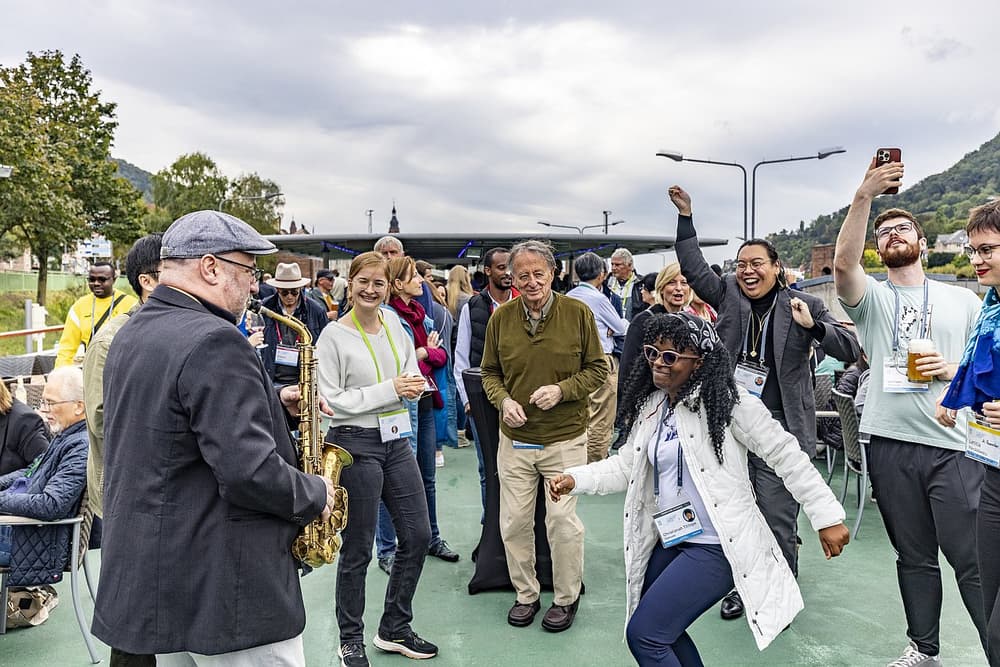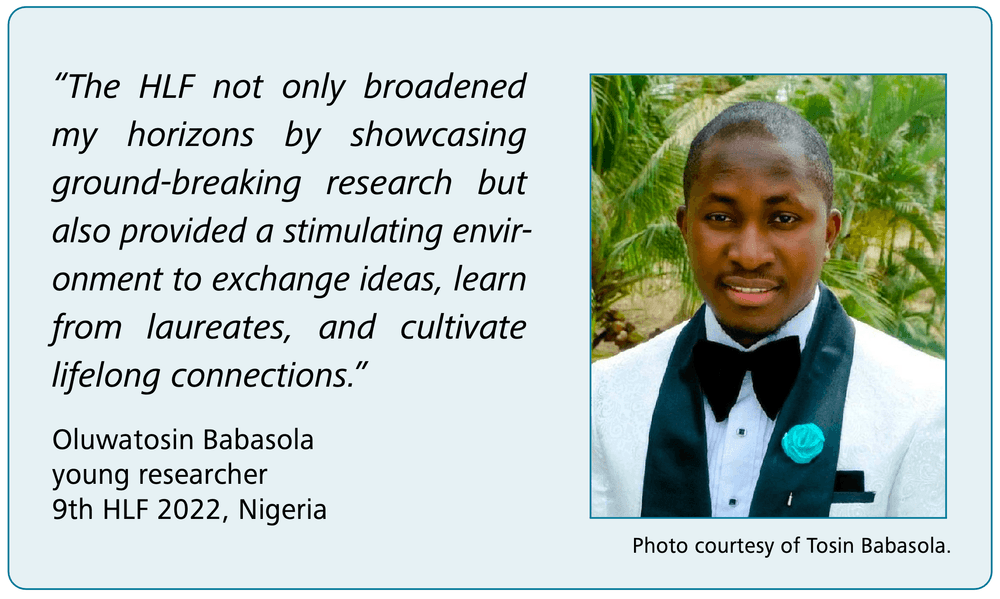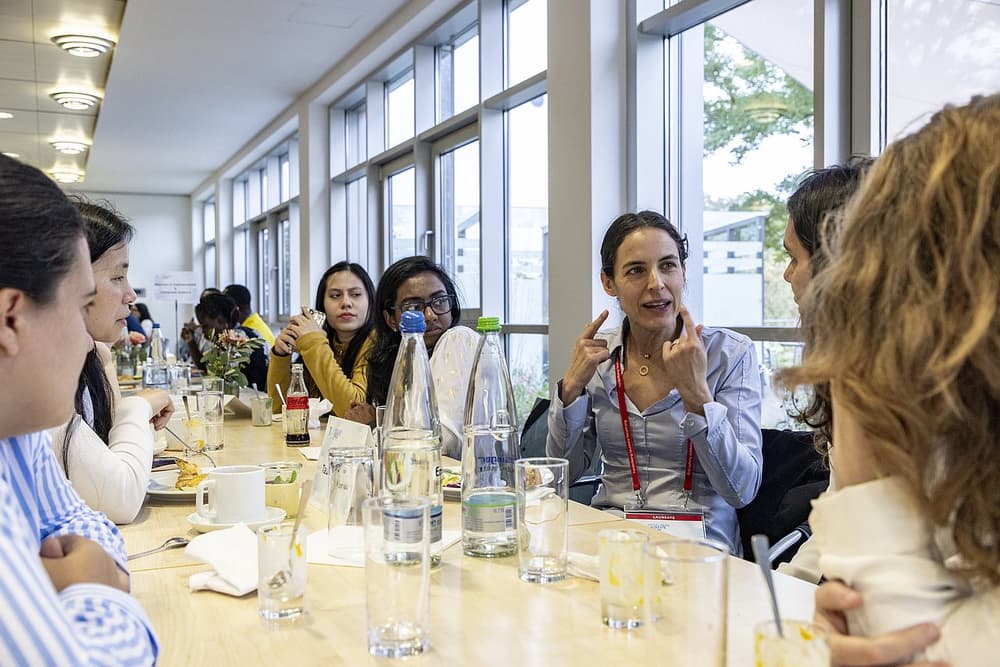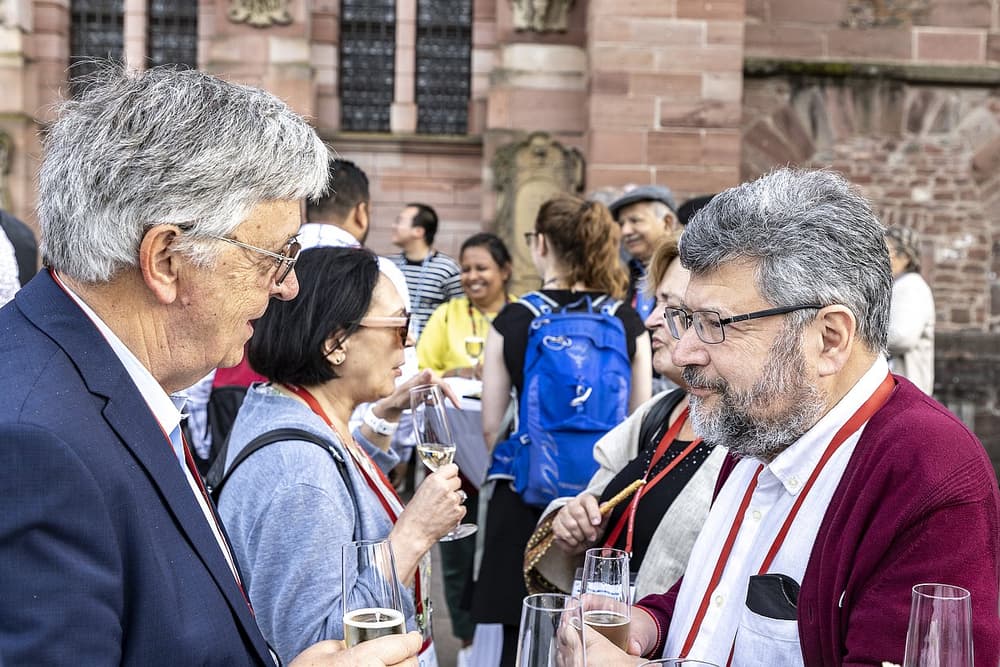Conferences are an integral part of early career researchers’ academic training. But how about a conference with a twist – one where young researchers take centre stage, and where their interaction with senior leaders in the field is not about listening, but about discussion and the exchange of ideas?
The Heidelberg Laureate forum (HLF) is an annual event offering young researchers from around the globe the chance to mix and mingle with laureates of the main prizes in mathematics and computer science. The aim is to inspire the next generation of researchers in these fields through interaction with people whose work has been foundational, whose thoughts spark new ideas, and whose advice (and anecdotes) can be invaluable.
Whether you are a young researcher, someone seeking to encourage the early career researchers you work with, or even a laureate yourself, we would like to introduce you to the HLF and invite you to apply, encourage applications, and take part.
Sparking interactions
The HLF is organised by the Heidelberg Laureate Forum Foundation (HLFF). Each September, over the course of a week, 200 young researchers, from undergraduate to postdoctoral level, meet recipients of the Fields Medal and the Abel Prize in the field of mathematics, the ACM A.M. Turing Award and the ACM Prize in Computing in the field of computer science, and the IMU Abacus Medal and Nevanlinna Prize, representing the overlap between the two fields.
The HLF offers the scientific lectures, workshops and poster sessions you would recognise from any scientific meeting. But in addition, there are unique and welcoming opportunities for all participants to interact: panel discussions, speed networking sessions, discussions in small groups, and coffee breaks and meals allowing ample time for talk. There is also a busy social programme including a boat trip down the river Neckar (with opportunities for dancing), a Bavarian beer fest, and dinner at the Heidelberg castle. At all events the laureates mix with the young researchers, formally and informally, and in return enjoy a chance to see old friends and meet a diverse group of brilliant young mathematicians and computer scientists who will lead future research.
Dennis Sullivan (2022 Abel Prize) dancing with young researchers at the 11th HLF 2024.
©Heidelberg Laureate Forum Foundation
“One of the goals of the HLF is sparking scientific interactions between the laureates and the young researchers,” says Anna Wienhard, scientific chair of the Heidelberg Laureate Forum Foundation. “And I say sparking because that scientific interaction may start in a lecture or a panel discussion, but then continue in the coffee break afterwards, or in a discussion over dinner. The other goal is to get mathematicians and computer scientists together to exchange and discuss the challenges within these fields and at their interface, and also to go beyond and see what is the role that mathematics and computer science play in our society.”
Young researchers from around the world
The HLF was initiated, and is funded, by the German foundation Klaus Tschira Stiftung,1https://klaus-tschira-stiftung.de which promotes natural sciences, mathematics and computer science. The HLF was inspired by the Lindau Nobel Laureate Meetings, which support exchange between Nobel laureates and young scientists.
Bavarian evening at the 10th HLF 2023.
©Heidelberg Laureate Forum Foundation
The organisations which award the prizes that are being represented – the International Mathematical Union (IMU), the Norwegian Academy of Science and Letters (DNVA), and the Association for Computing Machinery (ACM) – are partners of the HLF. These are the organisations that choose the young researchers, who arrive from more than 50 countries each year. “The HLF provides the infrastructure for the applications by the young researchers, but the selection is in the hands of the award granting institutions,” says Wienhard.
Applications from young researchers are invited between November and February each year. The 200 successful applicants are chosen in equal parts from mathematics and computer science, balancing the overlap between the fields, in a way that ensures geographical, gender and social diversity and equity. “It is not just young researchers from top universities that come to the HLF,” says Wienhard. “The group is much more diverse than that, so laureates can interact with people they may not meet at ordinary scientific conferences.”
To ensure a balanced choice, each application is read by three reviewers from a team chosen by the award granting institutions. The team is selected to ensure they have an understanding and experience of the geographical regions applicants come from, as well as the fields they are studying. And while quantitative measures, such as exam grades, are important, much weight is given to letters of recommendation and, crucially, the applicants’ own letter of motivation. “The ability to ask good questions is vital,” says Sergei Tabachnikov, professor of mathematics at Pennsylvania State University, who is involved in selecting applicants. “It is also important that they will be able to make the most of their opportunity to interact with other HLF participants when they are here.”
The excitement among the young researchers each year is palpable. Laureate lectures and panel discussions themselves present rare opportunities; but being able to present lightning talks and posters to this eminent audience, and to have informal chats or even a little dance with a laureate, goes far beyond what most will have experienced in their academic life so far. And it creates a lasting impact. “There is a certain exposure to scientific ideas, topics, and discussions, which has an influence on the directions young researchers choose in the future,” says Wienhard.
Equally important as interactions with laureates is the opportunity to connect with a select and interesting group of other young researchers. “One important goal is to create networks between young people, especially if they are geographically remote,” says Tabachnikov. The HLF offers several projects to make sure the connections that are made within a week in September last far into the future, and that young researchers are supported beyond the event itself.
“Our network for young researchers to stay connected after the event is called AlumNode,2https://alumnode.org a cooperation with the Klaus Tschira Stiftung and the German Scholars Organisation,” says Sarah MacLeod, Head of Young Researcher Relations for the HLF. “It is an interdisciplinary alumni network the young researchers can join. They can apply for joint project funding, and we offer them workshops, peer mentoring, and regular gatherings. We also have the HLFF Spotlight series3https://heidelberg-laureate-forum.org/young-researchers/hlff-spotlight where we highlight the happenings in the lives of our alumni.” Additionally, in 2023 the HLFF Inspiring Minds project4https://heidelberg-laureate-forum.org/young-researchers/alumni/hlff-inspiring-minds was launched, which provides expertise and guidance through an expert mentoring programme and a range of engaging digital formats designed to support alumni in developing their personal career path.
Bringing together the brightest minds
The content of the scientific programme is planned by the HLF scientific committee, which comprises international experts in mathematics and computer science and representatives of the award granting organisations and the Heidelberg Laureate Forum Foundation. All laureates are welcome to contribute to the programme. The exact nature of laureates’ contributions is discussed in advance with the committee open to all sorts of propositions – from a traditional talk on a topic of a laureate’s choice, to discussion groups, master classes, and visits to local schools.
Apart from sessions involving laureates, there are also activities focused on particular areas chosen by the committee. This year featured two Hot Topics examined through discussions involving experts in the area: understanding the climate crisis and the differences between human and machine learning.
Those participants who are not young researchers, and in particular the laureates, are attracted to the HLF by more than just the excellent food and accommodation, beautiful surroundings, and desire to support the next generation.
“The HLF is a chance to meet experts in mathematics and computer science, as well as very bright young people,” says Efim Zelmanov, who won a Fields Medal in 1994 and has attended almost every year. “It is also a fertile meeting ground of mathematics and computer science. The organisers’ warm hospitality is another definite plus.”
The interaction between mathematicians and computer scientists at all levels is indeed a key attraction of the HLF. “Very interesting things happen at the interface between maths and computer science, and it is important to bring researchers together,” says Wienhard.
Vinton Cerf, who received the ACM A.M. Turing Award in 2004 and has been involved with the HLF from the beginning, also enjoys the open invitation to all laureates of the prizes involved: “I got to see some old friends I had not seen in a long time and I keep getting to see them every year.” In recent years new types of sessions, such as Laureate Discussions have allowed participants to share ideas and insights in different ways, aiming, for example, to identify fruitful interactions between mathematics and computer science, and examining topics such as the role of mathematical proof in computer science. The Laureate Discussions are designed with the laureates’ input.
But it is not just the interaction with peers that laureates and other experts find invigorating. The young researchers who attend are not only among the brightest, they also come from regions of the world and social backgrounds that are not always represented at scientific conferences. “I really enjoy talking to the young researchers, they are really interesting with a lot of curiosity,” said cryptographer Yael Kalai (2022 ACM Prize in Computing) at the 11th HLF 2024. “It is very rare to see such a spread of people from so many different communities, so many places around the world … I am hopeful that someday I will see that kind of spread in my own academic community.”
Finally, the HLF provides an opportunity for the research community to celebrate those important prizes and so celebrate mathematics and computer science themselves.
Yael Kalai (2022 ACM Prize in Computing) in discussion with young researchers over lunch at the 11th HLF, 2024.
©Heidelberg Laureate Forum Foundation
Into the future
Last year saw the 10th anniversary of the HLF. To mark the occasion, several new types of sessions were introduced. Lightning Talks are short, rapid-fire, one-slide presentations by laureates looking at an important breakthrough from the past, a challenge for the future, or a piece of advice for young researchers. In Spark Sessions laureates explore current research in short talks, while Master Classes explore specialised topics. These new formats have proved hugely popular. Examples from this year’s HLF include a Spark Session with Fields Medallist Martin Hairer taming infinities, and a Lightning Talk with Fields Medallist Efim Zelmanov exploring the challenges still posed by the classification of finite simple groups.
László Lovász (2021 Abel Prize) talking to Efim Zelmanov (1994 Fields Medal) during the final evening celebrations of the 11th HLF 2024.
©Heidelberg Laureate Forum Foundation
A total of eight mathematics laureates attended the 11th HLF. In an interview for the HLF Vlog5https://newsroom.hlf-foundation.org/media-library/vloghlf Abel laureate László Lovász explained some of the benefits of the HLF for the laureates: “You can see that all over the world there are people who love your subject, who are devoted to science. So the future looks brighter than before meeting them.”
With the HLF now having entered its second decade, we would like to invite young mathematicians from around the world, as well as laureates, to apply and attend. As young researcher Narinder Sing Punn said at the 9th HLF 2022, “Apply for the HLF. It is a life-changing experience – do not miss this opportunity.”
All students and early career researchers in mathematics and computer science up to postdoctoral level can apply. Applications for the 12th HLF are open until 11 February 2025. To apply, please visit https://application.heidelberg-laureate-forum.org.
A version of this article first appeared in the Notices of the American Mathematical Society, DOI 10.1090/noti2834.
- 1
- 2
- 3
https://heidelberg-laureate-forum.org/young-researchers/hlff-spotlight
- 4
https://heidelberg-laureate-forum.org/young-researchers/alumni/hlff-inspiring-minds
- 5
Cite this article
Marianne Freiberger, Rachel Thomas, The Heidelberg Laureate Forum: inspiring the next generation. Eur. Math. Soc. Mag. 134 (2024), pp. 41–44
DOI 10.4171/MAG/230







